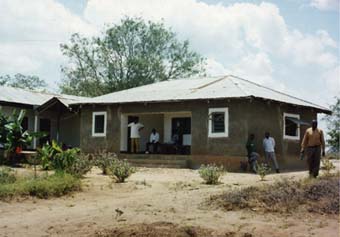A team of Tanzanian and refugee medical staff is attending locals and refugees whom are turning up for medical treatment at the
village dispensary. The
coverage of beneficiaries is at an average of 1200 patients respectively per month. Qualified staffs like clinical officers, nurse midwife, health
officers, nurses, a MCH officer and refugees attendants run the unit.
The drug supply is improved after UNHCR decide to increase the funds on the item. The district Authority is providing the supplement and a number of
staff.
Major common diseases affecting people in the area are intestinal worms, malaria,
pneumonia/UTI and diarrhea. They are the main causes of morbidity in the Village. HIV/AIDS cases are currently not diagnosed in the settlement.
Severe medical cases are referred to Korogwe District Hospital and letter to Muhimbili National Hospital. A national organization (UMATI) dealing with
urban caseload under UNHCR support is providing the necessary needs like medical expenses, meal and accommodation.
Mental health program have also been established and developed where by through home based care medical service and technical advices making sure
that the victims are taking the prescribed drugs.
In addition, to out patient dispensary (OPD) for better health improvement of the local and refugee training through health education have been
disseminated. Under MCH program the reproductive health department has been insisting on family planning and motherhood services. Followers on
family planning program are still low. Both communities refugee and
Tanzania are still practicing more home delivery compared to safe delivery at the dispensary. This is highly contributed by cultural believe
of Somali refugee specifically. Another traditional method and a big
drawback to the program is the habit of refugees to marry many wives and their reluctance to use family planning modern methods. Education is
underway to discourage the cultural habit. In this community a woman is regarded as reproductive instrument a notion accelerated by forced, arranged
and early marriage of women and girls.
Another cultural factor contributing to mothers and girls health problems is brought by female gender mutilation behaviors. Through community
development unit awareness raising campaign against the practice is
continuing.
Malnutrition rate especially to under-five is dealt accordingly as the organization has organized a feeding center in the
village. Thus, highly protein and vitamins rich foods are provided to the victims however
planned health education is also trained to the mothers whom attend at
the center.
Laboratory
Constrains
(1) The dispensary is supplied with drugs form the Government and the supplement
from UNHCR. This supply is a little bid less to in relation to the population. Received for medical service attention.
(2) Health education campaign is disseminated by the medical staff and is by two thing namely and cultural believe on traditional medicine uses and
illiteracy of both refugee and local people.
(3) The Dispensary is only having one labor room, which is sometimes used for admission of patients.
Achievements
Through information campaign better service have started to be provided to refugee and local people at the village dispensary.
The sector has been gradually reducing the number of referral cases to District and National Hospital. This was also contributed by measures of
increasing drug supply to the village. Communicable diseases especially water
born case are slowly reducing. This positive result is achieved form highly mass mobilization campaign aiming where by refugee are trained boiling
water before put into use.
